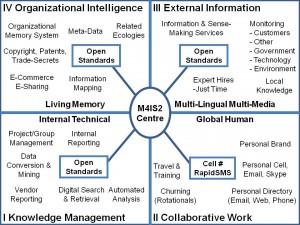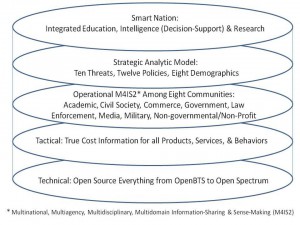
Are Search and Business Intelligence Merging?
Wrong tense. Search has been sucked into business intelligence as a subordinate or utility function.
Consultants and “experts” suggest that search and business intelligence are converging. Information Builders, based in New York City, suggests that the alleged convergence looks like two equally-sized markets merging like a math book’s illustration of a Venn diagram. The picture is symmetrical and appears to make sense. In my opinion, the presentation of “worlds’ merging” in an orderly manner is misleading at best and downright silly at worst.
. . . . . . . .
In the somewhat untidy worlds of search and business intelligence, not much has changed. Terminology and the fervent belief that new phrases will solve information problems is more important than tackling more fundamental, less zippy issues.
We have entered an era of same old, same old, and there is no turning back. The problem of computational limits force systems to work as they have for many years. The methods and the math is the same. The content types and the marketing lingo are different.

ROBERT STEELE: The complete analysis and two graphics are not indexed but available by free subscription to The Honk. Stephen E. Arnold remains one of my most trusted and reliable pulse-takers and scouts on information technology and intelligence (decision-support) analysis. The first remains balkanized and incredibly retarded; the second remains largely non-existent. Neither governments nor corporations nor non-profits — and certainly not academics — have done anything truly universal in value for a very long time.
Their persistent problems including a continuing assumption that there are enough idiots willing to pay for proprietary software and hardware in the face of the open source tsunami; that no one is going to enforce the long-established and equally dismissed demand for open data standards that eradicate all data conversion costs; the continued lack of any moral, financial, or professional commitment to true cost economics and whole systems modeling to identify the commercial value of the spaces between the data points; and the continued — truly insane — movement away from all human sources of near-real-time collection, processing, and analysis.

The next big leap, in my personal view, will occur when one government, one multi-billion dollar corporation (not Yahoo, Microsoft, or Google, they have all blown themselves up), or one specific multi-billionaire choose to bet on humanity and connecting humanity, instead of all the snake oil and bullshit coming out of the IT and pseudo intelligence worlds. The recent innovation in India, allowing hundreds of millions of people to search the Internet via text messages at an affordable cost, is characteristic of kind of human-centric computing and communications that in my personal judgment will change the world virtually overnight, not only creating infinite wealth for the five billion poorest, but also placing unethical organizations in a virtual head-lock in which buy-cotts and other forms of human harmonization via text stops the corrupt into the ground. Open Source It will take time, but the signs are there. One cannot eat money — imagine the day when anyone connected to any predatory enterprise is instantly recognized and denied physical life services because of the evil that they enable. That day is coming. The connected — using the Autonomous Internet and Liberation Technology — shall inherit the Earth, and there is not a damn think the elite can do about it. This next inning will take a quarter century, but the outcome appears inevitable: Human Brains + Open Source Everything + Informed Panarchy.

See Also:



